CHECK OUT Ledger Nano S TOP PROS:
- Simple and straightforward installation
- Bluetooth support
- Can store multiple coins at the same time
Since the invention of Bitcoin, the cryptocurrencies have been steadily increasing in popularity. An alternative currency to government-backed legal tender seems quite appealing to many. One look at the current price of Bitcoin and Ethereum tell you just how much cryptocurrencies are popular.
But how do you store cryptocurrencies? It’s not like you can have them printed or forged into a coin. That’s why you have to use a cryptocurrency wallet. In this article, we’ll discuss the different types of crypto wallets, their strengths and weaknesses, as well as showcase the best Bitcoin and Cryptocurrency wallets you can use today! If you are feeling weak on the crypto basics, you can checkout an awesome to guide on understanding cryptocurrencies.
So, before we get to our top list of best crypto wallets, let’s first discuss what they are and how they work.
CONTENTS:
- What are cryptocurrency wallets
- What are bItcoin banks and how to avoid thefts and scams
- 5 best hardware wallets
- 2 best hot wallets
- How we choose these products
| IMAGE | PRODUCT | DETAILS | |
|---|---|---|---|
 |
Our #1 Choice
Ledger Nano S |
|
Check on Amazon |
 |
Ledger Nano X |
|
Check on Amazon |
 |
Trezor One |
|
Check on Amazon |
 |
Trezor T |
|
Check on Amazon |
 |
KeepKey |
|
Check on Amazon |
What Are Cryptocurrency Wallets
Before you even start using any type of crypto, you have to set up a wallet. Why? Well, a “wallet” is essentially the equivalent of a bank account. It gives you the ability to receive Bitcoins as well as other cryptocurrencies. Most importantly, a Bitcoin/crypto wallet allows you to store your cryptocurrency and send it to others.
You should think of a wallet as your personal interface with the Bitcoin/crypto network, similar to how your online bank account allows you to interface with the conventional monetary system.
Cryptocurrency wallets contain private keys – secret strings of code that allow you to spend your coins.
In reality, you don’t need to store and secure your bitcoins, but the private keys that give you access to them.
To summarize, a bitcoin/crypto wallet is nothing more than an app, website, or a device that manages private keys for you.
Now that you have an understanding of what a crypto wallet is, let’s take a look at different types you can choose.
Hardware Wallets
A hardware crypto wallet is a physical, electronic device that’s built for the sole purpose of securing your coins. The core “shtick” is that the hardware wallet must be plugged in or connected to your computer, phone, or table before you can receive or send any coins.
Hardware wallets are the right choice if you’re extremely serious about security and convenient, reliable Bitcoin and crypto storage. These devices keep private keys separate from vulnerable, internet-connected devices. This means you don’t have to worry about someone hacking your machine and stealing your hard-earned coins. Even if your hardware wallet gets stolen, the thief won’t have much use of it since it’s password protected.
Your all-important private keys are maintained offline, in a secure environment of your hardware wallet. Even if your computer is infected with malicious software, it won’t be able to read the contents of the wallet because it’s encrypted.
Generating and storing your private keys offline is the best way to protect yourself from would-be attackers that would love nothing more than to get a hold of your crypto coins. Hackers can’t steal something that’s not connected to the internet.
Even if your hardware wallet gets stolen, the thief won’t have much use of it unless he managed to take your password. And if you lose, or damage your hardware wallet, you can always retrieve your precious crypto using your secret backup code you can create when setting up the device.
Potential Security Risks
While to this day, there are no records of Bitcoins getting stolen from a hardware wallet, there is always a small chance of that happening. These devices are relatively new, and you can rest assured that someone is trying to find a way to crack them.
Hardware wallets are not a silver bullet, and there are several ways in which they can fail to protect your cryptocurrencies. You need to take these risks very serious when deciding how much trust you can place in a hardware wallet.
Here are a couple of ways, your hardware wallet can get compromised:
- Malware that swaps recipient Bitcoin addresses – no matter how secure a hardware wallet is, it can’t protect you from being tricked into sending crypto to the wrong address. For instance, a malicious app on your computer could monitor for high-value. Then it can swap out the recipient’s authentic Bitcoin address for an address controlled by the hacker. If the stakes are particularly high, having two-factor verification of the transaction is a must!
- Insecure Random Number Generator (RNG) – hardware wallets primarily rely on the security of an RNG, commonly embedded in hardware, to securely generate your wallet’s private key. Unfortunately, it’s almost impossible to verify the randomness of the RNG. An insecure RNG may create keys that can later be recreated by an attacker by generating pseudo-randomness that would seem statistically indistinguishable from true randomness yet still be predictable enough to an attacker. An RNG can become insecure as a result of malicious weakening, lousy design, or an unintentional mistake. This failure mode is standard to any wallet generation process in which the true randomness of the source of entropy being used can’t be verified.
- Bad implementation – the security of any electronic device solely relies on the quality of its implementation, and hardware wallets are no exception to this rule. Bugs at the hardware, firmware or software level can allow attackers to break into the hardware wallet and gain unauthorized access to its precious contents. Even if the design of the wallet is impeccable, proving the security of hardware or software implementation is close to impossible. To this date, no hardware wallet in existence is implemented using provably secure software.
- Compromise production or shipping process – even a perfect software and hardware implementation of a hardware wallet can be vulnerable to a corrupt production process that introduces intentional (back doors) or unintentional (bad design) holes into the final product. The troubles don’t end there, a compromised fulfillment process can substitute or modify secure devices for seemingly identical but insecure replacements. The most common culprit is no other than the government.
Hot Wallets
Hot crypto wallets are wallets that run on internet-connected devices such as computers, smartphones, and tablets.
Just like hardware wallets, hot wallets rely on private keys for security. The only problem with this is that hot wallets are generating these private keys on a device that is connected to the internet, which is inherently insecure.
Think of a hot wallet as your physical wallet. You use your wallet to store some cash, but not your entire life savings. Hot wallets are excellent for small, frequent payments, but they’re not a good choice as secure storage for your Bitcoins.
Besides being entirely online-based, hot wallets don’t differ from hardware wallets. They are more convenient than hardware wallets since you can access them more easily from all your devices. Furthermore, this type of wallet usually supports a wide variety of cryptocurrencies, something hardware wallets still don’t do because some cryptos aren’t popular enough.
There are a ton of ways to implement a hot wallet, with some companies offering far more protection than others. Here’s what you should look for when choosing a hot wallet:
- On-chain wallets: Even though most hot wallets are entirely free, some are less secure than others. Before signing up to a particular one, make sure the hot wallet you’re interested in is directly represented on the blockchain. Some wallet providers pool your funds along with funds of other users and use an offline database to work out what belongs to you.
- Ket ownership: Some hot wallet providers retain ownership over your private keys. This basically means they have full control over your funds. And unless they’re a regulated bank, the only protection you have against theft is the conscience of the people running the service. We live in an age where you can easily lose access to your funds, not because you were hacked, but because of your political views might not coincide with the ones your payment processor has. Not so long ago, PayPal banned Alex Jones from their services because they found his political views deplorable. While you might think this was justified, it creates a precedent, and it won’t be too long before hot wallet providers follow suit.
- Independent: Most people use exchange accounts as a place to store their crypto. These exchanges commonly employ fund pooling. This means they’re putting all customers’ funds into one massive, combined wallet, while they hold all the private keys for operational efficiency. Exchanges are not typically designed to be used as wallets, and they’re the biggest targets for hacking attacks as they tend to hold lots of client funds. This is why you should look for a wallet that utilizes partner exchanges rather than keeping your funds exchange.
- Insured: A couple of hot wallet providers claim to offer insurance that protects your funds. While this is a good thing, you should check out the terms and conditions for fine points to ensure your funds are personally guaranteed against theft and lost keys.
What are Bitcoin Banks and How to Avoid Thefts and Scams
One last thing you should keep in mind when it comes to Bitcoin wallets is that there is a big difference between a crypto wallet and a crypto bank. Some cryptocurrency users view Coinbase as a crypto wallet, but companies such as this operate more like a traditional bank.
Keep in mind that your private key is what you need to protect and safely use the Bitcoin network without the risk of getting robbed. When you hand over the control of your private keys to a private company, you are essentially making a deposit at a bank.
We’re not saying that Bitcoin banks are inherently bad. Companies like Coinbase have done wonders for cryptocurrencies because they brought millions of users to the ecosystem. What we’re saying is that it’s important to remember that whoever has access to the private keys controls the crypto attached to those keys.
A misunderstanding of this fact has caused hundreds of millions of dollars to be lost in the past. This is why it’s incredibly important you understand this critical difference in how private keys can be stored.
As with any technology, understanding how crypto wallets work is incredibly important if you want to keep your precious crypto safe. Although cryptocurrency technology is almost ten years old, it is still in its early stages of development, which means wallets will become much more user-friendly shortly.
Who knows, maybe in a couple of years we’ll have devices that feature pre-installed wallets that interact with the blockchain without your knowledge. As things currently stand, it’s important to remember that you need to protect your private keys if you want to keep your crypto safe from thieves, user errors, and many other possible issues.
No matter which type of crypto wallet you choose, you NEED to remember that your crypto will only be safe if the private key was generated securely, remains a secret, and is controlled by you, and only you!
To avoid scams, thefts, or any other loss of funds, you need to follow these three principles:
- You MUST generate your private keys in a secure, offline environment! This principle doesn’t apply to situations when you’re creating burner accounts, or you’re planning on using the wallet to transfer trivial amounts.
- Always, ALWAYS create backups of your private keys. This ensures you won’t lose all your funds because of SSD or hard drive failure, or due to some other mishap. For maximum security, you should keep a duplicate of the backup somewhere off-site, so you don’t lose your funds in case of fire or robbery.
- Encrypt your wallet for additional security. Encrypting your crypto wallet ensures you won’t lose your funds because you got robbed.
Ensuring your crypto is safe and secure is the most important thing for any crypto user.
With cryptocurrencies, you have the privilege and the responsibility of safeguarding your own money. There are countless Bitcoin scams currently running on the internet, and most of them can be easily avoided by not trusting other people with your money. When it comes to cryptocurrencies, you should never trust anyone else with your private keys.
This covers everything you should know about Bitcoin and cryptocurrency wallets. Now it’s time to see our list of top picks.
The 5 Best Hardware Wallets
Hardware wallets are the way to go if you have a large amount of crypto you want to keep safe. Hardware wallets are the most reliable way of keeping your crypto safe and protected, and in this section, we’ve picked five best models you should consider buying.
So, let’s jump right into it!
1. Ledger Nano S
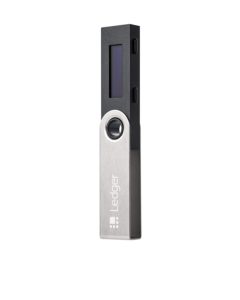
Hailing from Paris, Ledger is one of the most respected and credible hardware wallet manufacturers on the market. The company launched in 2014, and since then, they’ve sold over a million units around the world.
At the heart of every one of their products lies a unique operating system called BOLOS. Ledger integrates this system either to a secure chip or in a hardware security module. The company is also planning on launching the Ledger Vault, a security solution for banks, hedge funds, and other companies that plan on dealing in cryptocurrencies.
The Ledger Nano S is one of their best-selling crypto wallets, and with good reason. It offers excellent security and decent coin support. Let’s take a closer look at this product.
Ledger Nano S is a compact USB device that’s based on a smart card. At first glance, it’s almost indistinguishable from a regular USB drive measuring 39 x 13 x 4 millimeters and weight around 6 grams.
This crypto wallet comes in an excellent package that contains the unit itself, a micro-USB cable, a lanyard (if you want to wear it around your neck), a keychain, a keyring, and a recovery sheet for writing down the seed keyword.
To activate the device, you have to connect it to your computer using the USB cable. Once you choose the option to create a new wallet, you will have to confirm the PIN code. You must remember the said PIN code since you’ll need it each time you want to access the Nano S.
You don’t have to worry about your favorite crypto not being supported because this device natively supports 1184 coins. These include Bitcoin, Bitcoin Cash, Binance Coin, Cardano, Dash, Dogecoin, Eos, Ethereum, Ethereum Classic, Litecoin, Monero, Ripple, just to name a few.
Pros
- Supports a more than 1000 coins
- Simple and straightforward setup
- Features Ledger’s Secure technology
- Very affordable
Cons
- The technology used is closed-source hardware
Bottom Line
If you deal in multiple crypto coins and are looking for a hardware wallet that’s simple to use and secure, then the Ledger Nano S is the best choice for you. It’s beautifully designed and most importantly, extremely secure.
2. Ledger Nano X
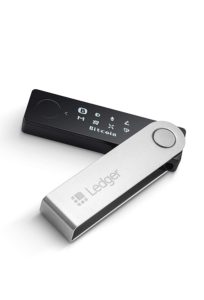
The Ledger Nano X is legitimately one of the most reliable hardware wallets on the market, and it looks pretty stylish too. The Nano X features superior security thanks to it’s two integrated security chips. For added convenience, it also has a Bluetooth feature that allows you to use it with your computer or phone without the need for a wire.
The most significant difference between the Nano X and the Nano S is that the former can store multiple cryptocurrencies at once. The Nano S requires you manually install and remove apps to use a particular wallet. The Nano X allows you to install multiple crypto wallets at the same time.
This hardware wallet measures 72mm x 18.6mm x 11.75 millimeters and weighs around 30 grams. This makes it a bit bigger than the Nano S, but with a good reason. Because it has integrated Bluetooth, it needs a battery to power it. Speaking of battery, it has the capacity of 100mAh and allows days of use before you have to recharge it.
Along with the unit itself you also get one USB C cable, a keychain, three recovery sheets, and a sticker pack. We don’t recommend you use the keychain because it’s a bit flimsy and feels like it could snap at any moment. Also, you should keep the recovery sheets somewhere secure in case you lose it.
The Nano X supports the same cryptocurrencies as the Nano S, which include Bitcoin, Bitcoin Chas, Ethereum, Litecoin, Dogecoin, Monero, and many others. Unlike the Nano S, which can store only one type of crypto at a time, the Nano X can store several at once. When you decide to add new coins to the Nano X, you’ll have to install its respective app. The installation process is quite straightforward and takes minutes to complete.
Pros
- Simple and straightforward installation
- Bluetooth support
- Can store multiple coins at the same time
- Very low-profile since it resembles a regular USB stick
Cons
- Features closed-source hardware
- The UI is a bit unintuitive
Bottom Line
The Ledger Nano X is an excellent choice for any crypto enthusiast that likes trading in multiple currencies and is looking for a device that can easily connect to a smartphone. The only thing we don’t like about it is the somewhat unintuitive UI design, and we hope Ledger fixes it.
3. Trezor One
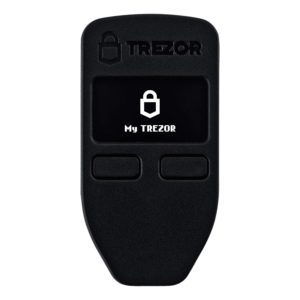
Trezor is well known and respected manufacturer of hardware Bitcoin wallets. In fact, they were the first company to launch a hardware wallet. The Trezor One was developed in SatoshiLabs and was genuinely pioneering in every way.
Every Trezor wallet has a PIN code that never leaves it. Thanks to this simple feature, you don’t have to worry about your funds getting stolen because your computer got infected with malware. For additional security, the Trezor One features an inbuilt system that prevents brute force attacks. After each incorrect guess, the wait time is doubled. Making 30 wrong guesses will take up almost 17 years!
The Trezor One is backed up with the 24 words generated on setup. This 24-word seed is created offline using an RNG from the wallet itself and the computer, which ensures maximum security. If your Trezor gets stolen, you can quickly recover it using the 24-word seed and a passphrase.
The only thing you might find unappealing about this devices is its physical appearance. Unlike the Ledger Nano S which resembles a USB stick, Trezor One looks like a calculator. Because of this, any would-be thief will easily recognize it for what it is, a hardware wallet.
Thankfully, even if the Trezor One gets stolen, it is protected with a PIN code that’s synced with your companion app. After you connect it with your chosen interface, you will have to enter the PIN code which is randomly generated on the wallet and displayed in the form of a 3 by 3 square.
When it comes to coin support, the Trezor One supports 1064 different crypto coins, including the most popular ones such as Bitcoin, Ethereum, Litecoin, Bitcoin Cash, Dash, and many others.
Pros
- Simple to use
- Sleek design
- Doesn’t expose your private key
- Randomly generate PIN codes provides superb security
Cons
- A bit pricey
- Not as inconspicuous as the Nano S
Bottom Line
Trezor One is one of the most secure hardware wallets on the market. If you want a device with multiple layers of security and decent coin support, then look no further than the Trezore One!
4. Trezor T
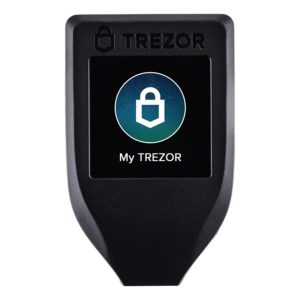
The Trezor T is an improved version of the Trezor One. It features a better display and also lacks any buttons. You control this device entirely via touchscreen. This is a double-edged sword since you can easily be left with a useless wallet in case you damage the screen.
However, the chances of the screen breaking are quite tiny because we assume you’ll take care of it since it will hold your precious crypto coins.
Now that we have our concerns out of the way, let’s see what you get out of the box. Along with the Trezor Model T, you also get a useful getting started guide, a magnetic dock, a recovery seed card, and a sticker pack, and a USB-C cable.
Setting up the Trezor T is quite simple. It works with the latest versions of Chrome and Firefox. It also works with smartphones so you can use it on the go. You connect the device with your computer or smartphone and open the trezor.io app to begin the execution process. Then you choose the Motel T option and follow the on-screen prompts. The wallet will ask you if you’re setting up a new device or you want to recover a pre-existing wallet. After you’ve selected one of the options, the wallet will prompt you to enter two random words from the seed sheet. You must make sure the device doesn’t power down if you don’t want to start over.
When it comes to coin support, the Model T supports most popular and not so famous coins including Bitcoin, Ripple, Cardano, Monero, and Tezos. We only wish it was a bit less pricey, but you can’t put a price on security.
Pros
- Simple to set up and use
- Stylish design
- Can be used on all of the popular operating systems
- Keeps your private key safe
Cons
- A bit pricey
- Not as inconspicuous as the Ledger Nano S
Bottom Line
The Trezor T is an excellent improvement from the Trezor One. It not only supports more coins than the latter model but also features a sleeker design. The only thing that might deter you from buying it is its high price point, but you can’t put a price on security.
5. KeepKey
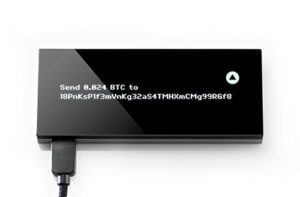
KeepKey is a relative latecomer to the hardware wallet market. The company was founded in 2015 by Darin Stanchfield with its headquarters located in the US. The company acquired Bitcoin wallet manufacturer Multibit in 2016 and in 2017, the company was acquired by Shapeshift, a Swiss crypto exchange founded by Erik Voorhees. KeepKey is one of the most affordable and well-built hardware wallets on the market.
Out of the box, along with the unit itself you also get a USB cable, a cardboard recovery sentence dare and a warranty leaflet. The device is pretty huge in terms of a hardware wallet, measuring 38 x 93.5 x 12.2 millimeters and weight almost 60 grams. The device features a massive 256 by 64-pixel 3.12-inch OLED screen which is protected by a polycarbonate casing. The back of the KeepKey is built out of aluminum. The wallet features a single button which you can use to cancel transactions. While you can charge it via the USB cable or the power bank, to use it, you need to connect it to the KeepKey browser add-on.
Setting up the wallet is pretty simple. First, you have to download the KeepKey browser addon on either your Chrome or Firefox. After that, you have to connect the device to your computer and open the KeepKey app. The device will then update to the latest firmware version if it’s available, and once it’s finished, you will be presented with your private key. The private key is displayed only once, and you need to keep it secret. After that, you will have to create a PIN code. Once you created a PIN, you will be presented with a 12-word recovery seed, you will have to memorize or write down so you can recover your wallet in case of theft or failure.
KeepKey natively supports sending and receiving of the following cryptocurrencies: Bitcoin, Bitcoin Cas, Bitcoin Gold, DASH, Dogecoin, Ethereum, and Litecoin.
Pros
- Large LCD screen
- Well-built
- User-friendly design
- Superb security
Cons
- The recovery seed is displayed only once
- Limited coin support
- Dodgy customer support
Bottom Line
If you’re looking for a reasonably priced hardware wallet that offers decent security, then look no further than the KeepKey. Even though it has somewhat limited coin support, it’s incredibly easy to use and is quite durable.
The 2 Best Hot Wallets
Now that we have hardware wallets out of the way, it’s time to take a look at so-called hot wallets. Hot wallets can be run on any internet-connected device like a computer, smartphone, or tablet. They’re an excellent choice if you’re planning on making small transactions, they’re not suitable for storing large sums of coins.
1. GreenAddress
GreenAddress is a multi-signature Bitcoin wallet that can be accessed via a web browser. It also comes in the form of an app for iOS, Android, and in the form of a desktop app. Furthermore, it’s compatible with hardware wallets such as Trezor and Ledger.
Sending and receiving crypto is extremely secure thanks to GreenAdress’ “2of2” and “2of3” accounts. Your main account on GreenAddress is a 2of2 account, which means that two signatures are required to validate any transaction. One signature comes from you, and the other comes from the GreenAddress. They sign your transaction only If it complies with the limits you previously set up, and exclusively after you’ve provided the two-factor authentication. This means that a potential thief first has to gain access to your wallet and then also hack your two-factor authentication to steal your coins. This is practically impossible.
The design of the UI is quite simple but comes with a vast number of features on the wallet. It can be a bit confusing for beginners, thankfully their support is top notch and is always ready to answer any of your questions.
When it comes to bitcoin transfers to and from GreenAdrress, they are entirely done using bank transfers via an intermediary like a Bitcoin exchange or a broker. Everything is done via bank transfers because online payment processors like PayPal still don’t support Bitcoin and other cryptos directly.
When it comes to exchanging sources, GreenAddress supports a significant number of them, including BitcoinAverage, BitStamp,Kraken, LocalBitcoins, The Rock Trading, and many others. You can also migrate from another wallet to GreenAdress. All you have to do is enter your private key, and the coins will be swept into your wallet.
Pros:
- Easy integration with hardware wallets and mobile environments
- It’s an open-source project
- It’s completely free to install and use
- You have full control over the account and not a third party
Cons:
- The somewhat unintuitive UI design
- Setup takes a bit more time compared to other hot wallets
- Only supports Bitcoins
Bottom Line
Thanks to plenty of features and security layers, the GreenAddress is one of the most trustworthy hot wallets on the internet. The extended features are quite useful for an experienced user, and they can take advantage of different benefits of the wallet on multiple platforms.
2. Coinbase
Coinbase is one of the biggest cryptocurrency companies in the world with more than 20 million users and support in over 42 countries. The company offers a wide variety of services, but their leading service allows you to buy and sell Bitcoins via a bank account, credit card, and debit card. The rates are generally fair, but their customer service is quite terrible.
Coinbase offers quite a few services, including brokerage service, a Coinbase Pro, and Coinbase Wallet.
The primary service of the Coinbase is the brokerage service which allows you to buy and sell various cryptocurrencies. Most new crypto users find themselves buying their first coins via this service because of the reputation Coinbase has. The only downside to this service is the lack of control over you own funds. When you create a Coinbase account, you don’t get direct access to your coins, and you don’t get a private key or a seed-phrase.
Coinbase Pro is a service that’s aimed at more experienced users. Coinbase Pro allows you to trade several cryptocurrencies including Bitcoin, Ethereum and Litecoin. The most significant advantage that this service offers are the low service fees and the advanced trading options.
Last year, Coinbase Launched its independent mobile wallet for Android and iOS. This hot wallet stores your private keys on your smartphone or tablet and only you have access to them. This brings Coinbase full circle because it started out a sa hot wallet, then transitioned to crypto exchange, only to transition back to offering wallet services.
Currently, Coinbase supports multiple cryptocurrencies. Those include Bitcoin, Ethereum, Ripple, Litecoin, Bitcoin Cash, EOS, Stellar Lumens, Ethereum Classic, Zcash, Augor, Dai, USD Coin, 0x, and Basic Attention Token.
Pros:
- Easy to understand and use
- Excellent UI design that’s friendly to new users
- Relatively low transaction fees
Cons:
- You don’t directly control your private keys
- Accounts are closely monitored
- Terrible customer support
Bottom Line
No matter what you might have heard about Coinbase, it’s very safe to use. The company has invested a lot of money and time into making your experience using it smooth and quite painless, which can’t be said for most other hot wallets on the internet. Unfortunately, you are not in direct control over your own private keys, and your transactions are being carefully tracked. We think the company is too focused on its growth rather than satisfying the current user base which can be seen by the number of negative reviews they get. We recommend you use Coinbase as a place to buy cryptocurrencies, and not as a place to store them, which is why we put it into second place in this list.
How We Choose These Products
When compiling the list of products we wanted to showcase in this article we had a lot of challenges. First, we had to make sure the products we were showcasing are 100 percent safe, which is quite challenging because there are many shady companies out there.
The next thing we focused on was the ease of use. Most Bitcoin wallets are notoriously tricky to use by novice users that aren’t well versed in cryptocurrencies.
We also tried to showcase well-built devices. There is no point in getting a hardware wallet that will break the second you drop it. This is why all products showcased above are built out of high-quality materials that can withstand a lot of punishment, and in some cases fire damage.
When it comes to hot wallets, we decided to showcase you one that gives you direct control over your private keys but has unintuitive UI design, and one that has excellent UI design but doesn’t give you direct control over your private keys. Why? Well, because you can’t have both things at once. You have to pick between a good UI design and having full control over your private keys.
What do you think about Bitcoin and cryptocurrency wallets? Are they worth the investment? Let us know in the comments below!
YOU MAY ALSO LIKE:
How to Get Started in Cryptocurrency
Everything you need to know about Cryptocurrency tax laws in the US
Mining Cryptocurrencies On Your Phone And All You Need To Know About It




No Responses